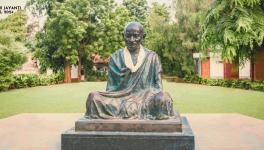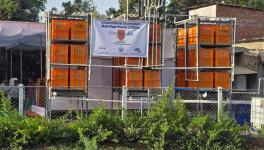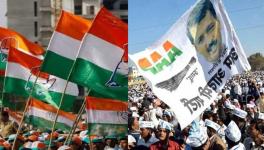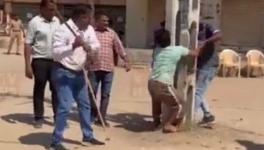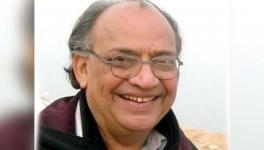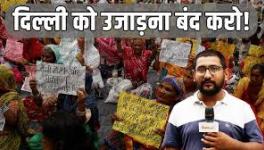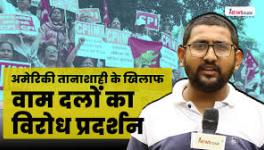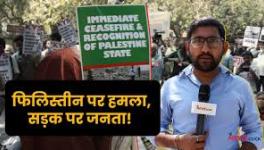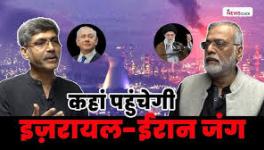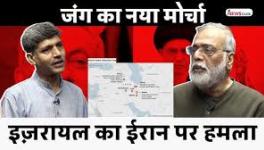Gulberg: When No One Responded to Ex-MP Ahsan Jafri's Distress Calls (An Excerpt from Final Solution)
Says film maker Rakesh Sharma:
"I've filmed inside the Gulberg society on multiple occasions - twice in 2002, once in 2007, and thrice in 2012. Each time, it is an eerie experience, standing inside the Jafri home, imagining February 28, 2002, with people packed inside seeking shelter. Mr Jafri desperately ringing up everyone he could. The mobs launching their multiple attacks...and that moment of decision when Mr Jafri decided to hand himself over to the mob, hoping all others would be spared....
Here, in this sequence filmed in 2002, listen to the eyewitness accounts of the 2 young men who were helping Mr Jafri make calls. They specifically speak of calls to Sonia Gandhi and her political secretary, Mr Ahmed Patel of Gujarat. Presumably, they tried to reach Modi to arrange for protection to their own ex-MP. Listen to the boys speak of the call to Modi's office itself."
This is an excerpt from Final Solution, the national award-winning film that probes politics of hate. The film, premiered at the Berlin film festival, has over a dozen international awards, including the Berlinale's Staudte Prize (now known as the Golden Bear for Best Debut).
The original version certified by the Indian Censor Board (CBFC) was over 3.5 hours long. A year later, a shorter 2.5 hour version was made (separately certified by CBFC) for public screenings.
Mr Modi, in his responses to SIT claimed he did not know of the Gulberg massacre till late evening 830 pm. He also said that he did not know who Mr Jafri was. Narendra Modi's statement can be read here.
A little known fact: Less than a week before, Modi won his by-election from Rajkot with a small margin of approx 12,000 votes. The rather spirited Congress campaign in the constituency was handled, among others, by Mr Ehsan Jafri, Congress leader and former Member of Parliament. (Zakia Jafri Protest Petition, April 15, 2013)
Narendra Modi has, by and large remained mum about the massacres, especially Ahsan Jafri and Gulberg Society The first time was in an interview to Zee TV on March 1, 2002, just a day after the massacre. The second time was during his interrogation by the special investigation team (SIT) set up by the Supreme Court to examine the role of the chief minister and other senior officials – a demand that was made by Zakia Jafri, widow of former MP and prominent Gulberg society resident, Ahsan Jafri, who was killed by the mob on February 28. Zakiua Jafri's complaint and plea were backed by citizens legal aid group, Citizens for Justice and Peace (CJP).
In both instances, his words are worth recalling.
To Zee TV, Modi cited press reports that Jafri had opened fire on the mob outside the housing society’s gates. Jafri’s ‘action’ of firing, Modi said, had angered the mob, leading to a ‘reaction’ in the form of the massacre. ‘Kriya pratikriya ki chain chal rahi hai. Hum chahate hain ki na kriya ho aur na pratikriya. (“What is happening is a chain of action and reaction. What I want is that there should be no action and no reaction”).
He then linked the riots to the original “action” at Godhra, in which train passengers had been killed on February 27, 2002:
“Godhra main jo purso hua, jaha par 40 mahilaon aur bachon ko zinda jala diya, is mein desh mein aur videsh mein sadma pahuchna swabhavik tha. Godhra ke is ilake ke logon ki criminal tendencies rahe hain, in logon ne pehle mahila teacher ka khoon kiya aur ab ye jaghanya apradh kiya hai jiski pratikriya ho rahi hai.” (“It is natural that what happened in Godhra day before yesterday, where forty women and children were burnt alive, has shocked the country and the world. The people in that part of Godhra have had criminal tendencies. Earlier, these people had murdered women teachers. And now they have done this terrible crime for which a reaction is going on.”)
Confronted with this damning ‘action-reaction’ theory by the SIT in 2010, Modi, who was still chief minister, said this by way of explanation:
“Those who have read the history of Gujarat would definitely be aware that communal violence in Gujarat has a very old history. Since long and even before my birth, Gujarat has witnessed series of incidents of such communal violence. As per available history, from 1714 AD to up till now, in Gujarat, thousands of incidents of communal violence have been recorded.
“So far as the Zee TV interview of 1st March 2002 is concerned, today, after a period of eight years, I do not recollect the exact words. But I had always appealed only and only for peace. I had tried to convey to the people to shun violence in straight and simple language.
“If my words cited in this question are considered in the correct perspective, then it would be evident that there is a very earnest appeal for refraining from any kind of violence. I deny all the allegations levelled against me in this regard.”
The SIT also asked Modi whether it was true that Jafri had called him to ask for help. Several residents of the Gulberg housing society – including Rupa Modi, a Parsi woman whose 14-year-old son Azhar went missing that day and is presumed dead – testified in court in 2009 that Jafri told her and others he had “called up Modi but had received only abuses in return”.
Modi’s reply to the SIT on this point:
“In this connection I would like to add here that no such phone call had been received by me.” (emphasis added)
Could Jafri’s call have been answered by one of the chief minister’s aides? Sadly, the SIT did not ask a follow-up question on this point.
Astonishing claim
The SIT also asked Modi: “Did you receive any information about an attack by a mob on the Gulberg society? If so, when and through whom? What action did you take in the matter?”
To this, Modi replied:
“To the best of my recollection, I was informed in the Law and Order review meeting held in the night about the attack on Gulberg society in the Meghaninagar area and Naroda Patiya.” (emphasis added)
A shocking claim, using any yardstick. The violence in Ahmedabad had started in the morning soon after the bodies of the kars evaks were brought to the Sola Civil hospital and two funeral processions with angry mobs alklowed. Nearly 200 Muslims had been massacred at both locations by the afternoon. Yet Modi was saying that as chief minister, he first learned of these attacks only at night! Despite the fact that Modi prefaced his answer with the tell-tale caveat “to the best of my recollection”, the SIT chose to accept his version at face value rather examining its plausibility based on other evidence on record.
Disclaimer: The views expressed here are the author's personal views, and do not necessarily represent the views of Newsclick
Get the latest reports & analysis with people's perspective on Protests, movements & deep analytical videos, discussions of the current affairs in your Telegram app. Subscribe to NewsClick's Telegram channel & get Real-Time updates on stories, as they get published on our website.









